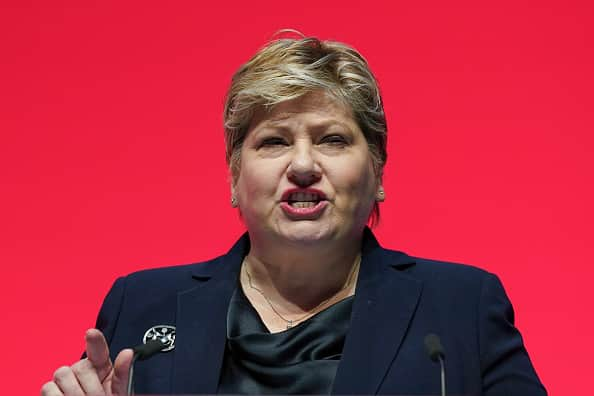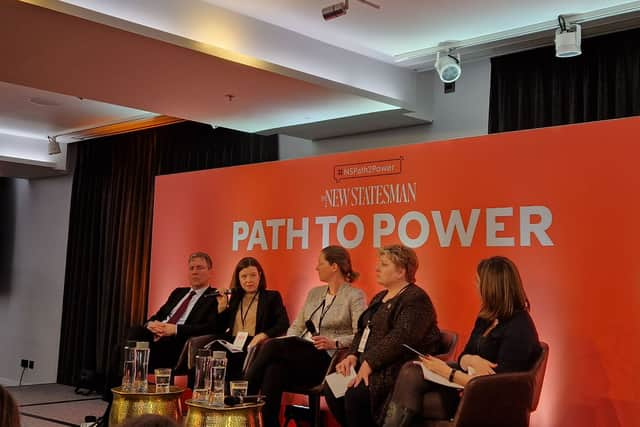Facebook & Instagram scams: Meta should pay victims says Labour's Emily Thornberry
and live on Freeview channel 276
Meta should pay fraud victims who succumb to scams on Facebook and Instagram, Emily Thornberry said. The Shadow Attorney General said that the tech giant, as well as banks, should be legally required to support and fund a national fraud prevention strategy. Thornberry said she hoped this would incentivise Meta to bring in more robust anti-fraud measures.
More than 70% of shopping scams start on Meta-owned platforms, such as Facebook and Instagram, recent research from Lloyds Bank found. While UK Finance, the industry body representing banks, estimated 140,000 Britons lost money to fraud on Meta sites every year.
Advertisement
Hide AdAdvertisement
Hide AdAt the New Statesman's Path to Power conference today (28 November), Thornberry hit out at the Silicon Valley giant.
“Most fraud that's happening online is happening through Facebook and happening through Instagram,” the Shadow Attorney General said. “If you try and buy things through other sites of the internet there are various checks that are made but Meta doesn't bother.”
And she suggested forcing social media companies to reimburse victims, in a similar way that banks often do, and fund anti-fraud measures could stimulate more action. Thornberry said: “Why can’t Facebook pay you back, why can’t Instagram pay you back? Maybe we could ask the banks to pay us back and Meta to pay us back, and we could have the additional money for fighting fraud. Meta would close the loopholes pretty damn fast if they were being asked to pay this back.”
She spoke of a malaise around fraud, saying victims never expect perpetrators to be caught and often don’t even report it to the police. Thornberry added: “If you are a victim of a fraud would you tell anyone apart from your bank. Would you bother? Would you bother to tell the police? Would you expect it to be investigated? Would you expect anyone to be caught and prosecuted? Actually we just shrug, and that’s very much a 21st century attitude to half of crime - and I don’t think that’s right.”
Advertisement
Hide AdAdvertisement
Hide AdWhile Liz Ziegler, Lloyds’ fraud and financial crime director, called on any future Labour government to have a specific minister for economic crime. She said: “We need to have coordinated leadership across economic crime and central accountability … economic crime deserves to be a standalone security threat, with resourcing commensurate to the problem.”
Ziegler explained that more needs to be done to hold tech companies to account over fraud, and incentivise them to tackle it at source. “Currently the tech sector and telecommunications companies do not contribute to reimbursing victims of fraud, despite nearly 80% of fraud cases being facilitated through online platforms,” Ziegler explained. She said in particular these scams originated on Facebook and Instagram.


“We need to hold these sectors to account, and incentivise greater action to tackle fraud at source. We’re calling on the government, and any future government, to ensure tech and telecommunications reimburse victims, and also be accountable for stopping the fraud. We also need legislation to mandate information sharing as that's the best way of tackling it.”
Currently between 40% and 50% of all UK crime is fraud, and Ziegler explained that many of the proceeds fund far more serious offences, such as terrorism, drug gangs and human trafficking. “It’s so often used as a way to fund more serious crimes,” she added.
Advertisement
Hide AdAdvertisement
Hide AdMeta recently agreed to sign up to an online fraud charter, which commits tech companies to a higher standard of verification and vetting of people selling goods on Facebook and Instagram. In October, Security Minister Tom Tugendhat travelled to Silicon Valley to meet executives from Meta, X (Twitter) and Google to discuss this.


At the time, Chris Philp, Crime and Policing Minister, told the Times: “It’s vital that social media platforms step up to the plate and play their part in preventing fraud, including preventing fraudsters getting on their platform in the first place, for example by verifying the identity of people advertising services or goods for sale. Social media is such a large part of our economy now, they must take full responsibility for fraud and crime prevention.”
A Meta spokesperson told NationalWorld: “With tens of millions of people using our apps daily in the UK, we recognise our important role in tackling the industry-wide issue of online purchase scams and have systems in place to block scams. We encourage our community to report scams immediately so we can take action and we'll continue equipping customers with knowledge to transact securely and avoid fraud.”
Comment Guidelines
National World encourages reader discussion on our stories. User feedback, insights and back-and-forth exchanges add a rich layer of context to reporting. Please review our Community Guidelines before commenting.
